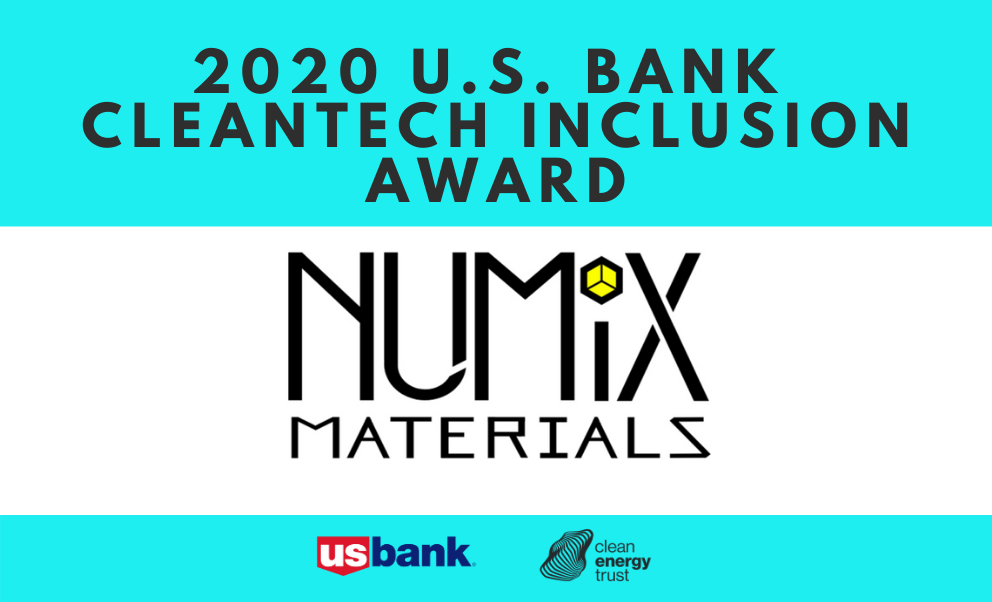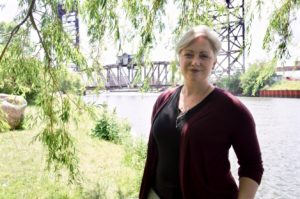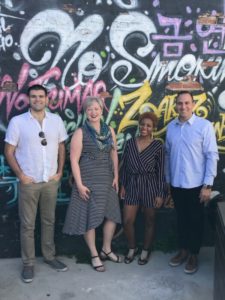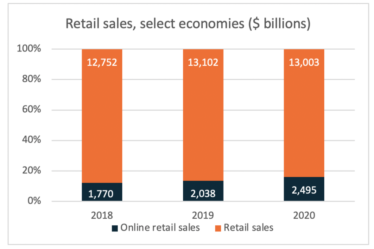
Earlier this summer, Clean Energy Trust announced NUMiX Materials as the winner of the inaugural U.S. Bank Cleantech Inclusion Award, a program designed to support female and minority entrepreneurs who are building innovative companies that benefit the environment, create jobs, and drive economic development.
By prioritizing equity and justice through this award, Clean Energy Trust can further our mission of supporting early-stage cleantech startups in the Mid-Continent region of the United States. This award aims to support the brightest minds working on climate innovation since the climate solutions we need will come from smart, motivated people from all walks of life.
Speaking of bright, motivated people, we’d like to introduce you to the award recipient NUMiX Materials, a women-run cleantech startup that recovers metals from contaminated water for future reuse. NUMiX received a non-recourse grant of $25,000, 12-months of business mentorship and programming from U.S. Bank and Clean Energy Trust, and heightened exposure to both investors and potential customers.
Following the award announcement, we spoke with NUMiX Materials Co-Founder and CEO Katie Kollhoff, to learn more about her truly innovative cleantech company.

Tell us a bit about yourself.
Q: What is your background and how did it lead you to become a cleantech entrepreneur?
A: I’m Katie Kollhoff, co-founder & CEO of NUMiX Materials, Inc.
We are so honored to receive the U.S. Bank Cleantech Inclusion Award. Winning this award will help to drive forward our efforts to harvest metal contamination from water and put both back into useful life.
Before we founded the company two years ago, I’d been working in environmental health and safety for about 10 years. Across many settings and roles, from university R&D to large-scale chemical production, I helped clients in regulated industries manage chemical process risk to minimize impact to people, the environment, and business/ project continuity.
I carry two takeaways from those experiences, which inform work at NUMiX. First, the physical, and often hazardous, waste generated in manufacturing the technologies of the future is not sustainable, and worse, disposing of it properly is expensive and convoluted. Second, seeking and listening to diverse perspectives, from the cleaning crew to the head of the organization, is absolutely required when attempting to solve big problems.
In those experiences, admittedly, I’ve always liked taking on the hairiest challenges, from deactivating chemicals on the verge of explosion to capturing invisible dissolved metals in water so it can be safely discharged.
With the rest of the team at NUMiX, we developed a materials-based approach to that last type of problem, which is only growing as a global challenge. Once we identified the market opportunity and the physical approach, it didn’t make sense not to pursue entrepreneurship.
While early-stage entrepreneurship is often a full speed ahead endeavor, I make time for cycling around Chicago (even in winter!), concocting ice creams, brewing beer, and roasting coffee.
You truly are a chemical engineer – we’d like to learn more about your materials-based approach.
Q: What’s unique about your technology?
A: We make materials to harvest critical metals from contaminated water. Our adsorbents, which remain solid when placed in water, trap dissolved metals in their structure, allowing for easy purification of metal-contaminated water and retrieval of metals.
NUMiX was founded on the idea that there has to be a way to treat water better than the millennia-old methods currently in use.
Beyond our technology, we’re a passionate, creative, and engaged team with technical and business expertise, and we love putting together the pieces that make physical technology work seamlessly for customers. Our initial founding team is 75% women, in strong contrast to typical team makeup for companies like ours.
Sustainability through efficient use of materials underpins all of our work, from how we source and manufacture our proprietary adsorbents to how we reduce end-of-process waste in customer applications to how we enable diversification of critical metal supply.
We also believe deeply in our responsibility to grow the ecosystem for deep tech and sustainability-focused companies. We’ve been fortunate to receive support from a variety of organizations and mentors, so we share our knowledge, strategies, and passion with other early-stage (even idea stage) groups as much as possible.
An innovative, sustainable technology and your founding team is 75% women! No wonder we were and continue to be so inspired by your story.
Q: Who inspires you? And, what is your favorite advice to share with other cleantech entrepreneurs?
A: I’m constantly inspired by the successes, failures, hard work and confidence of other underestimated cleantech entrepreneurs—people who, even in the face of adversity, innovate and cleverly strategize to build products to bring the new energy economy closer
Though it took me years to understand this, my advice to other cleantech entrepreneurs is: first, understand yourself and your own motivations; second, don’t let any other person define your dream or limits; and third, ask – for what you want, about things you don’t know, for what is right.
You’re obviously very passionate about your work and bring a great deal of experience to your role as CEO.
Q: What drives you and your team?
A: We geek out about the systems level issues with materials flows, hard goods manufacturing, historical waste sites, water treatment, global commodity supply chains, and how all those pieces fit together in the context of cleantech.
We’re passionate about enabling sustainability, in terms of materials and energy efficiency, and we’re driven to contribute what we can, in a way that creates value for all stakeholders. For instance, a product in our pipeline will recover cobalt and nickel from spent lithium-ion batteries more efficiently than current processes.

Your upcoming lithium-ion battery recycling project sounds great. We’ll be sure to update our ecosystem with information on it when you can share more.
Q: How did you and your founding team meet?
A: The initial founding team of NUMiX got together in a course at Northwestern University, called NUvention: Energy. We were completing graduate studies in different fields, and we came from wildly different backgrounds.
In our time there, we engaged in business model development and customer discovery training, and we found mentors with recent experience accelerating an idea to market in a short span of time, demonstrating the depth and breadth of entrepreneurship potential
Shortly after the course ended, we participated in the Rice Business Plan Competition, where we won our initial funding, and it’s been nonstop ever since!
You’re following in some impressive footsteps. We are big fans of NUvention: Energy, which might be obvious if you’re familiar with our portfolio. We wholeheartedly believe that anyone interested in early-stage cleantech innovation should be keeping a pulse on universities throughout the Midwest.
Q: Congratulations again on winning the inaugural U.S. Bank Cleantech Inclusion Award! Why did you apply, and what do you hope to achieve as the winner?
A: We are so honored to be selected for this award. Our reason for applying was threefold: first, it seemed like we are the type of company the award was targeting, given the diversity of our founding team. Second, we specifically were seeking support for a technology demonstration project, whereby we aim to extract metals from surface water. Third, we recognized the invaluable opportunity to seek mentorship from experts while we continue to drive toward our next milestones.
With the success of this demonstration project, we will move toward full scale deployment of our metal harvesting systems, and we’re always looking for partners who are interested in exploring how to reduce their overall waste burden and treat their water better!

We definitely had your type of company in mind when we created the award and are so glad you applied and won. While financial support is key for any startup, we believe that mentorship is a particularly invaluable form of support for a cleantech startup.
Q: What is your vision for NUMiX?
A: We’re working at the intersection of the biggest problems of the future. Not only is clean water necessary for drinking and human use, it’s necessary for agriculture, for industrial production, and for material extraction.
As access to clean water becomes increasingly challenged, it will become more difficult to grow food and require more energy to purify it. At the same time, metal resource demand will skyrocket to support technologies for the new energy economy.
Our vision is to create sustainable materials that do double duty: reducing water quality challenges while recovering critical metals with less energy and less waste than current processes. By reducing the amount of materials leaving useful circulation, we contribute to the circular economy of the future.
Within the next ten years, we aim to supply customers with readily deployable, energy efficient materials recovery units, which will produce a diversified supply chain of critical materials, less waste generation, and cleaner water.
In the near term, that means successfully demonstrating our technology through the production of high purity, reclaimed metal.
Katie, thank you so much for telling us about NUMiX Materials. We are so proud to call NUMiX our inaugural U.S. Bank Cleantech Inclusion Award winner.

We will be sure to continue to check in with Katie and the NUMiX team to share updates on their progress and other exciting news.
In the meantime, we encourage you to explore their website to learn more about their technology and watch this video from Northwestern University featuring NUMiX Materials Co-founder & Ops Analyst Laurelle Banta.

